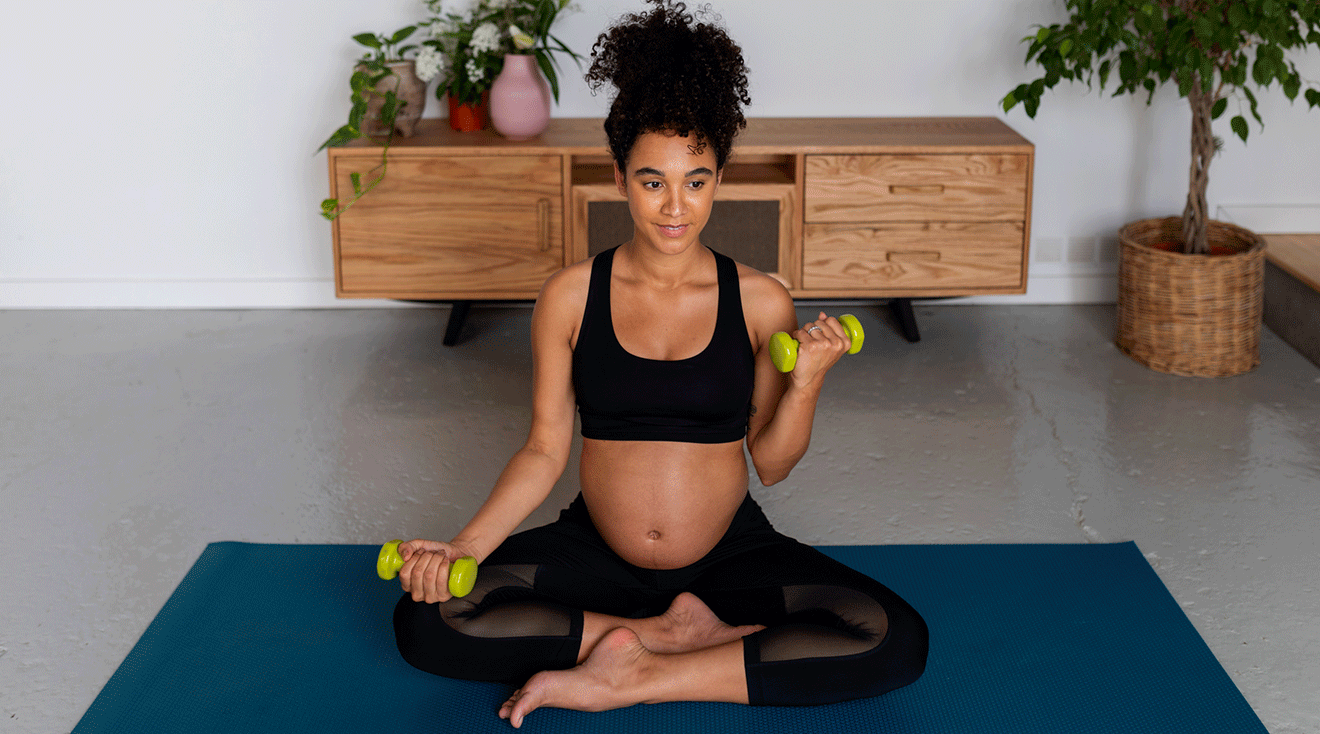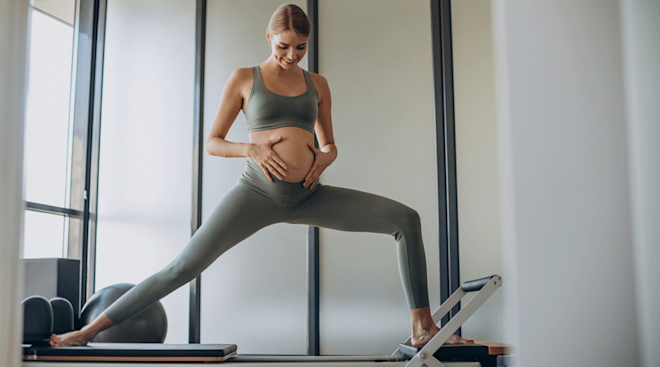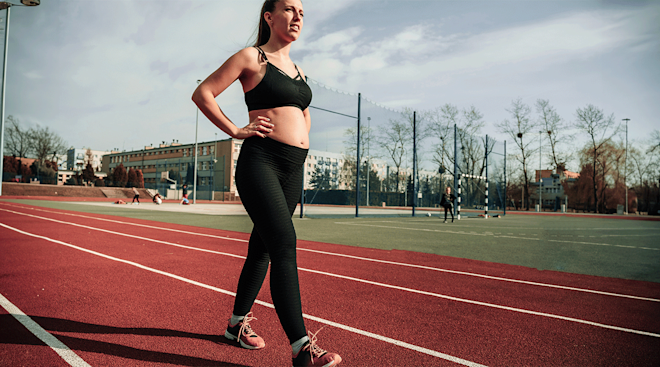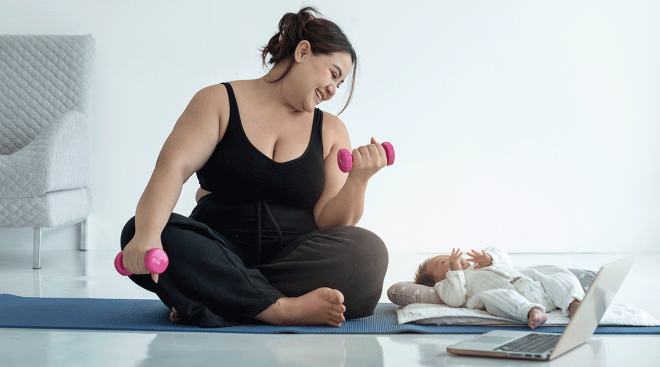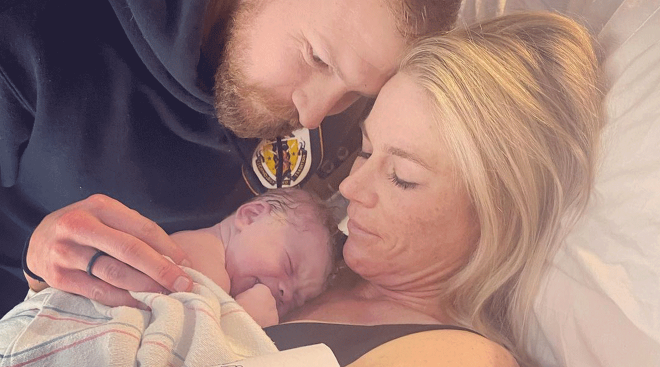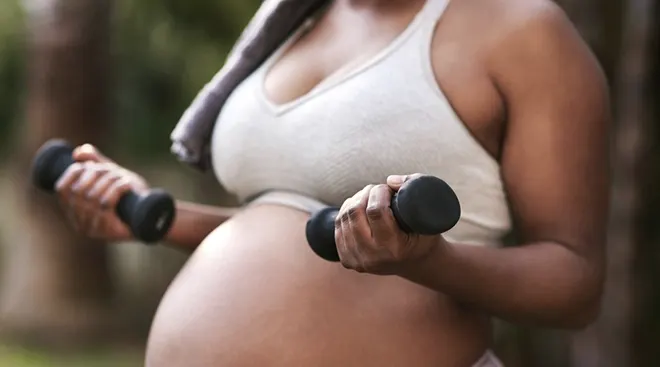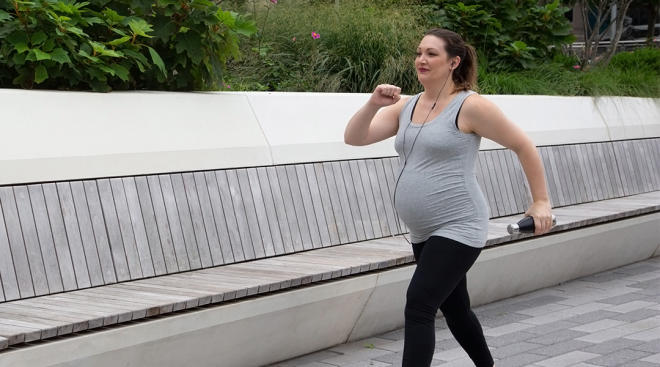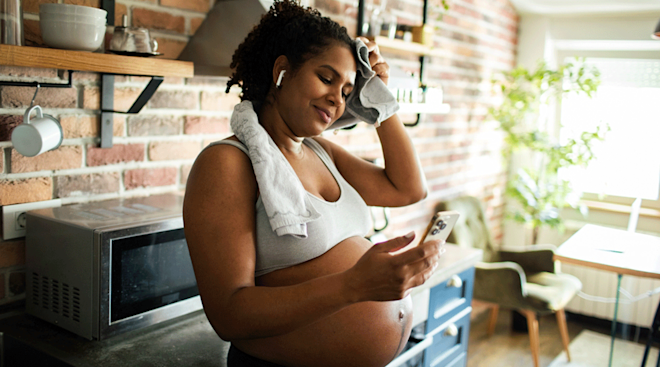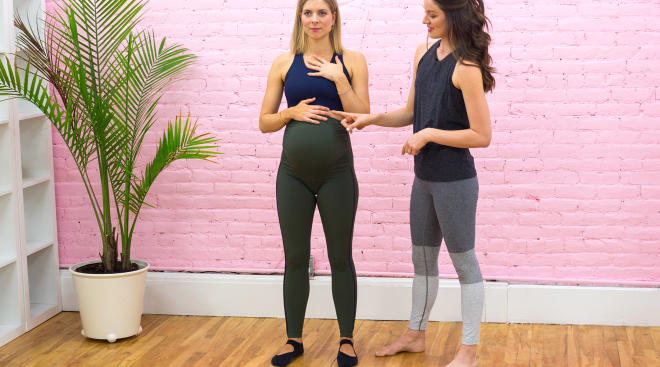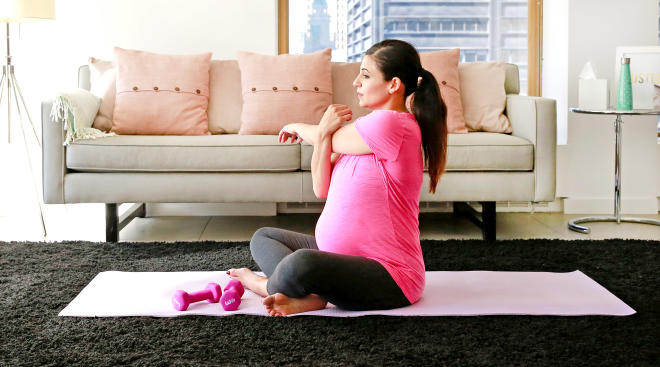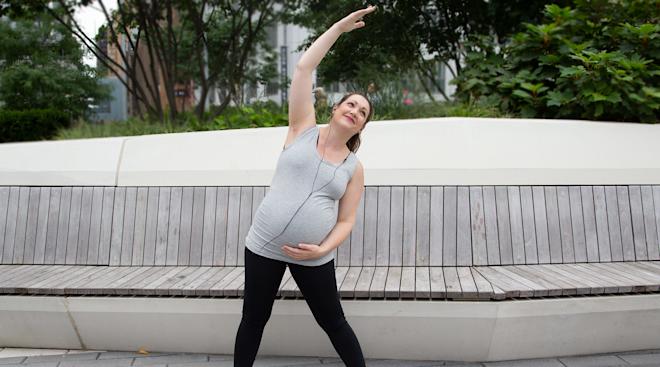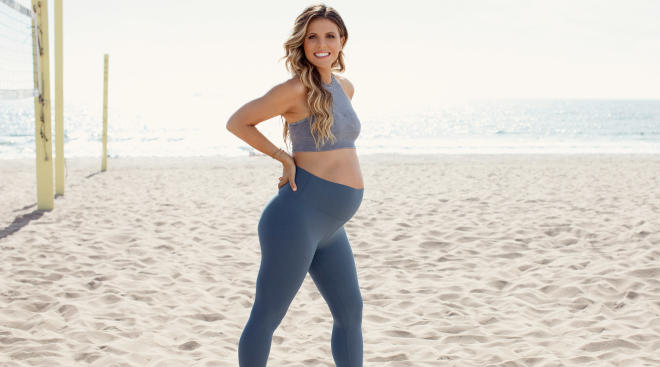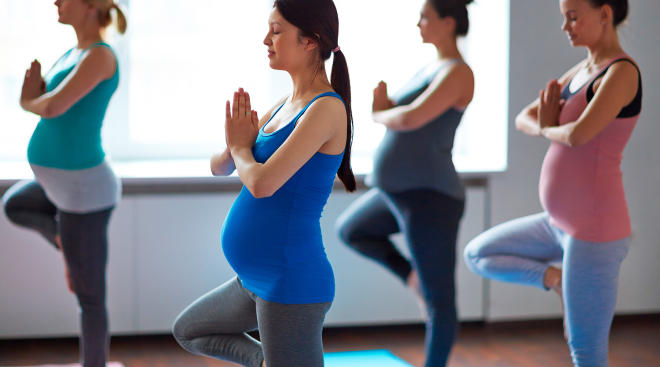Is Lifting Weights While Pregnant Safe?
You know breaking a sweat while expecting is important, but what’s the deal with lifting weights during pregnancy? Is lifting heavy things while pregnant in the first trimester okay? And is it fine to start a new strength training program if you’ve never done one before? Read on to learn from experts everything to know about lifting while pregnant, including what’s safe—and what’s not.
For the most part, it’s okay to lift weights while pregnant, especially for women and pregnant people who’ve lifted prior to pregnancy, says Meleen Chuang, MD, an ob-gyn and medical director of women’s health at the Family Health Centers at NYU Langone. That said, it’s important to be careful and get the green light from your healthcare provider first. “Generally, it’s safe to lift weights in all three trimesters, provided there are no complications and the mother feels comfortable,” she says.
Keep in mind it’ll probably be easiest to lift during the first trimester (barring any unpleasant nausea symptoms). During the second trimester, Chuang recommends maintaining or lowering the total weight, rather than trying to lift heavier weights. For the third trimester, use hand-held weights rather than the squat rack or kettlebells. “Light and easy is the way to go, and supplement with other types of moderate exercise regimen,” she says.
Unfortunately, there isn’t a clear-cut answer here. “Your pre-pregnancy fitness level, fitness routine and pregnancy symptoms all affect this answer,” explains Emily Clayman, CPT, PPNFS, PPNFTS, pre- and postnatal fitness specialist and founder of Push. Chuang agrees: “Listen to your body and avoid lifting weights that feel too heavy or cause discomfort.” In fact, you may find the weights you lift during pregnancy are lighter than the ones you’re used to—and that’s okay. “The most important thing is to not increase your intra-abdominal pressure too much while you’re bearing weights,” Chuang adds. (More on that below.)
As you probably already know, there are tons of benefits to pregnancy workouts—and weight lifting during pregnancy is no different. In a nutshell, the added weight of your bump puts stress on every aspect of your body, including your posture and strength, and can result in lots of body aches and pains. However, weight training during pregnancy strengthens your muscles and can help counteract some of this fatigue. Clayman and Chuang list improved posture, stronger stabilizing muscles and decreased aches (like back pain) as a top benefit of safe weight training during pregnancy. Not to mention it can also help improve sleep, which can be hard to come by during those nine+ months.
Along with improved physical symptoms, you’ll likely also see improved mental health, mood and energy levels. The reason for this is simple: Exercise releases endorphins, which are hormones in the body that boost overall well-being. Plus, weight training while pregnant can also lower your risk of pregnancy-induced conditions, including preeclampsia and gestational diabetes, Clayman notes.
A third big benefit of lifting weights during pregnancy is improved endurance. After all, giving birth to baby will test your physical and mental strength, but staying active can help you practice. According to Clayman, “If done correctly, strength training during pregnancy can properly prepare you for the physical demands of labor and delivery and motherhood.”
As with any exercise, lifting weights during pregnancy can have some risks, especially if done improperly. “Risks of weight training during pregnancy come from lack of education and awareness of what exercises you should focus on or avoid,” Clayman explains. “We also want to make sure the weight you’re using is appropriate for your individual body and that the exercises you do are appropriate for the stage of pregnancy you’re in.”
Some of these risks include overexertion, dehydration and more serious injuries, like pulled muscles and sprains, especially in your back. Some cases may also see complications like preterm labor, but Chuang assures that this is rare and “less likely for those that have experience with weight lifting before pregnancy.” Always pay attention to your limits and listen to your body. Above all else, consult with your provider before starting a strength training program in pregnancy.
Again, what counts as the “best” strength training exercise for you may be different from someone else, based on your unique pregnancy, medical history and fitness level. That said, the below types of strength training exercises during pregnancy are generally considered beneficial:
- Exercises using resistance bands
- Exercises using free weights
- Full-body bodyweight exercises
- Exercises using ankle weights
“Think about carrying a 1- to 3-pound weight and/or ankle weights when you’re taking a 30-minute walk as a safe way to lift weight,” Chuang says.
Wondering if it’s safe to use weight machines in pregnancy? The jury’s out on that one—Chuang says they can be safe, but Clayman says they may not be the best option due to hormonal and postural shifts. Always speak to your healthcare provider about the best prenatal strength training exercises and workout plan for you.
Safety is crucial when it comes to lifting weights during pregnancy. To ensure your and baby’s safety, below Chuang lists some safety tips:
- Always warm up: It can be tempting to skip your warm up when you’re eager to get down to the brass tacks of your workout, but warm ups and cool downs are more important in pregnancy than ever—especially before lifting.
- Stay hydrated and rest as needed: Workouts can be harder on your pregnant body. It’s important to stay hydrated, especially since you need to drink even more water during pregnancy. Plus, take ample breaks and give your body rest as it needs.
Along with listening to your body and taking the above precautions, there are also a bunch of things to avoid when it comes to lifting while pregnant:
- Stop holding your breath: You’ll want to avoid doing any exercises or lifting any weights that cause you to hold your breath or become short of breath, as they could increase your intra abdominal pressure (IAP), Clayman says. “To reduce this risk, it’s crucial to understand and implement proper breathing mechanics so that you’re able to engage and utilize the deeper core muscles.”
- Try not to strain or bear down: Related to holding your breath, you also want to avoid straining or bearing down. “The abdominal muscles, stretched over the ever-expanding uterus, lose strength and no longer function optimally, especially in their role as lumbar stabilizers, putting moms-to-be at risk for lumbar strains,” says Micky Marie Morrison, PT, certified prenatal fitness educator and founder of Baby Weight TV and CoreMama. “Body mechanics and maintaining proper form with weight lifting are even more important during pregnancy.” For this reason, avoid exercises that cause you to strain, have improper form or increase IAP. This includes sit-ups, anything that requires abdominal twisting, weighted squats and high-impact activities due to risk of heavy exertion, Chuang says.
- Avoid accidental abdominal trauma: Take care not to accidentally drop, bump or otherwise hit your weights against your abdomen, as this can cause injury and increase the risks of complications in pregnancy, Chuang notes. (This is also another reason you’ll want to steer clear of those high-impact activities.)
- Avoid exercises that dissociate shoulders and hips: As pregnancy progresses, your body produces more relaxin, a hormone that causes loose ligaments and increases the risk for joint pain and injuries, Morrison explains. For this reason, it’s best to avoid exercises that disassociate shoulders, hips or any other joints in the second and third trimesters, Clayman says.
- Don’t lie flat on your back: While this is okay during the first trimester, Chuang notes you’ll want to avoid exercises that require this in the second and third trimesters. Laying flat on your back during these months compresses the vena cava, a major blood vessel responsible for blood flow to baby and your uterus.
- Don’t work out in heated room: You probably won’t lift weights in a heated room the way you might do yoga, but it’s still good to know. Heated rooms increase your core body temperature, which can have adverse effects for baby.
- Avoid anything that causes pain: If anything you do causes pain, discomfort, coning in the abdomen, incontinence or vaginal leaking, stop doing it immediately and reach out to your provider, Clayman says.
Again, when to stop lifting weights while pregnant will depend on your individual circumstances. “If done properly, you can lift weights up until the day you deliver,” Clayman says, but “if you have any specific contraindications about working out from your doctor, you may need to stop earlier.”
You should also stop if you experience any of the following symptoms, Chuang notes:
- Severe pain
- Dizziness
- Shortness of breath
- Back pain
- Pulled muscle
- Cramping
- Spotting or vaginal bleeding
- Any other unusual symptoms
- Any other signs of complications
Frequently Asked Questions
How much weight can you lift when pregnant in the first trimester?
How much weight you can lift when pregnant in the first trimester will ultimately depend on several factors, including your pre-pregnancy fitness level and your provider’s recommendations. “You can typically lift your usual weights if you were already active,” Chuang says, but she recommends capping it at 15 pounds. “Focus on maintaining your strength and endurance, rather than going up on weights,” she adds.
How much weight can you lift when pregnant in the second trimester?
Similarly, how much weight you can lift when pregnant in the second trimester will depend on your personal circumstances. Again, focus on maintaining your strength rather than going for personal records. “Many women find it comfortable to continue lifting lighter weight and incorporate other types of exercise in their routine as their belly grows,” Chuang says.
Is it safe to lift toddlers during a subsequent pregnancy?
We normally don’t equate lifting toddlers to lifting weights, but it’s an important factor to consider when pregnant with a subsequent child. Experts say it’s safe to lift toddlers while pregnant, but it’ll depend on your personal conditions and comfortability. You’ll also want to be mindful of any pains, incontinence or strains lifting your toddler may cause. “We don't want something that causes any of the above to become a repetitive motion that could potentially lead to a longer term issue,” Clayman says. To help counteract this, use proper lifting techniques or ones that will help carry the weight, such as a baby carrier, Chuang adds.
Can lifting heavy things cause miscarriage in early pregnancy?
“Lifting heavy objects alone isn't considered a cause of miscarriage,” Chuang says. “It’s important to avoid overexertion and consult your ob-gyn if there are concerns.” Clayman agrees, adding that while lifting heavy objects isn’t a cause of miscarriage, it’s always best to check in with your healthcare provider before starting or continuing to lift weights while pregnant, especially if you’re dealing with medical conditions, a history or preterm labor or a high-risk pregnancy.
Can you lift weights over your head while pregnant?
While you can lift weights over your head while pregnant, Clayman says you’ll want to “be mindful of neutral alignment and core activation to support the body, and make sure you’re lifting an appropriate level of weight.” However, lifting weights overhead may become uncomfortable as your pregnancy progresses and may not be recommended after the second trimester. “Always prioritize safety and consult your ob-gyn,” Chuang emphasizes.
Can I lift weights while trying to get pregnant?
Experts note lifting weights and staying active can be helpful when trying to conceive, along with eating a healthy and balanced diet.
Can I start lifting weights while pregnant if I’ve never done so before?
While you can start a program for weight lifting during pregnancy, both Clayman and Chuang say to start with lighter weights and work with a certified prenatal fitness trainer for guidance.
Is lifting weights while pregnant with twins safe?
Yes, but a pregnancy with twins can often be higher-risk and have increased chances of preterm labor. “It’s important to work closely with your ob-gyn to ensure that the exercise regimen is appropriate, that you know what you're doing and take on exercise safely in pregnancy,” Chuang says.
Exercising during pregnancy is undoubtedly good for you and baby, but it can be tough to navigate—so much about your body is different now that you’re pregnant. Plus, these changes will continue until baby’s birth and beyond. The most important thing when it comes to exercising and lifting weights during pregnancy is to pay attention. As Chuang says, “Listen to your body and adjust your workouts as needed. Be flexible and open minded to adapt your exercise routine as you progress in your pregnancy.”
Please note: The Bump and the materials and information it contains are not intended to, and do not constitute, medical or other health advice or diagnosis and should not be used as such. You should always consult with a qualified physician or health professional about your specific circumstances.
Meleen Chuang, MD, is an ob-gyn and medical director of women’s health at the Family Health Centers at NYU Langone. She earned her medical degree from SUNY Stony Brook.
Emily Clayman, CPT, PPNFS, PPNFTS, is a pre- and postnatal fitness specialist with over a decade of experience. She’s also the founder and executive director of Push, a pre- and postnatal fitness training company.
Micky Marie Morrison, PT, is a licensed physical therapist with 15 years experience in women’s health and pediatrics, as well as an International Childbirth Education Association certified perinatal fitness educator. She’s also the founder of the prenatal and postpartum exercise programs CoreMama and online resource BabyWeight.TV, as well as the author of Baby Weight: The Complete Guide to Prenatal and Postpartum Fitness.
Learn how we ensure the accuracy of our content through our editorial and medical review process.
Navigate forward to interact with the calendar and select a date. Press the question mark key to get the keyboard shortcuts for changing dates.

































